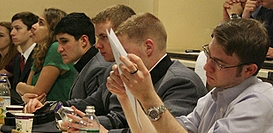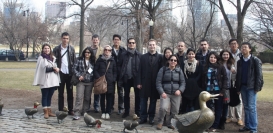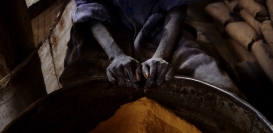Colloquium
EPIIC 2012-13: Global Health and Security
EXP 0091F
Tuesdays and Thursdays, 3:00-5:30pm,
Bi-monthly Discussion Sessions TBA
EPIIC is open to undergraduate and graduate students of all majors | EPIIC coursework can count toward credit in many majors
Full Credit/Letter Graded
“When it comes to global health, there is no ‘them’... only ‘us.’” – Global Health Council
This yearlong course will be an intensive multifaceted, multidisciplinary probe into historical, scientific, socio-economic, political, philosophical and ethical dimensions of the essential challenges and dilemmas of global health. In exploring the perplexing and critical questions that shape the future of the world, societies, and the human species, EPIIC will examine the intersections of health, security and human rights in the broadest sense.
Global health governance is one of the oldest forms of multilateral organization. It has been a unique arena of governance that integrates scientists, medical practitioners, philanthropists, governments, and international institutions with local communities. What has changed in recent decades is the accelerated impact of trade, climate change, international finance, and security concerns. New actors include finance ministries, international financial institutions, regional organizations, militaries, public-private partnerships, celebrity endorsement, and business coalitions.
EPIIC’s heuristic approach will probe the One Health concept. According to the One Health Initiative, the concept is “a world-wide strategy for expanding interdisciplinary collaborations and communications in all aspects of health care for humans, animals and the environment.” Its proponents hope “that the synergism achieved will advance health care for the 21st century and beyond by accelerating biomedical research discoveries, enhancing public health efficacy, expeditiously expanding the scientific knowledge base, and improving medical education and clinical care.”
One framework the class will investigate comes from Professor Andrew Lakoff’s thinking: the concept of “global health security” in comparison to the concept of “humanitarian bio medicine.” These two regimes have a contrasting understanding of whose health should be protected and of what are the most salient threats facing global populations. How is the world conceptually and practically organized around preparedness for potential catastrophic pandemics vs. the treatment of emerging and re-emerging infectious diseases?
Some of the questions the class will engage are:
• Is health a human right?
• What are the dynamics and politics of health disparities, including issues around poverty, gender, and race?
• How can global decision-making be balanced with decentralized implementation?
• What are the intersecting points for global health and national security?
• What is the effectiveness of the monitoring of disease and risk through surveillance systems?
• How realistic is the threat of bio terrorism? What is the impact of food insecurity on the health of nations?
• What is the complex relationship between water and diseases?
• What are the horizontal and vertical methods of global public health intervention? How are mental health disorders viewed, and treated, globally?
• What are the lasting health impacts of violence, including war, on individuals and society? Why are some societies resilient?
• What are the challenges of complex humanitarian interventions for medical professionals and humanitarian workers?
• What is the role of pharmaceutical companies in global health, access to medicines, and research and development?
• What are the ethical dilemmas posed by clinical research, particularly on vulnerable populations?
• What is the relationship between economics and medicine, from impacts on work productivity to what diseases to treat?
• What encompasses zoonosis and the intersection of veterinary and human medicine?
• What is the future of medical technology, from the Human Genome Project to nanotechnology, and its potential impact on security and inequalities?




